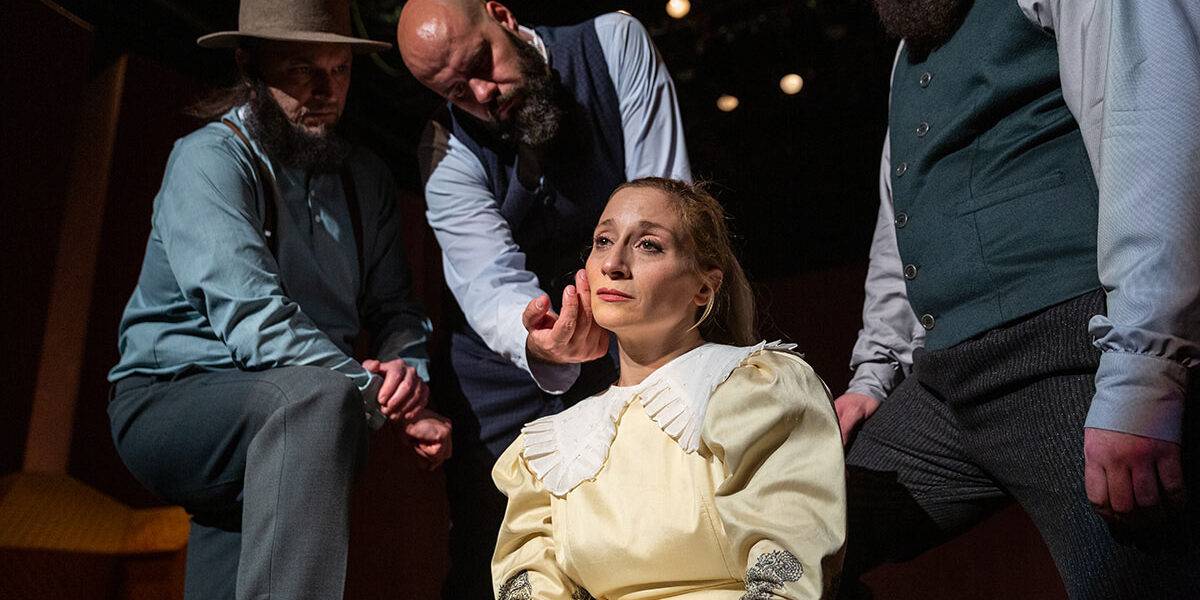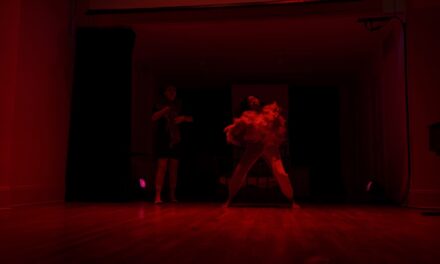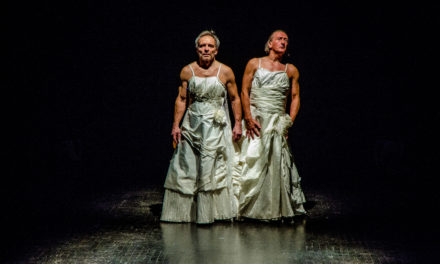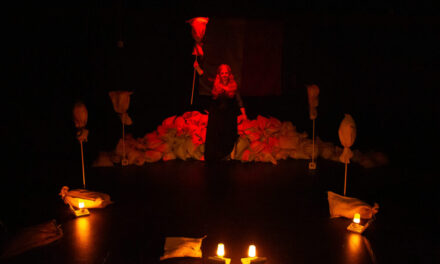The 68th Sterijino pozorje took place earlier this summer in Novi Sad. Critics Borisav Matić and Andrej Čanji discuss this year’s selection.
Borisav: May was a month of upheaval and existential questioning for many citizens of Serbia (and beyond), after two horrific mass shootings that happened in two days, including one perpetrated by a 13-year-old boy at a school.
Instead of unifying the public in times of grief, the president and the government polarized the nation even more which lead to perhaps the most massive anti-government protests in the last 20 years, Serbia Against Violence.
So when Sterijino pozorje came at the end of May, I questioned the usefulness of going to the theatre. But theatre again proved to be an effective platform for exploring important political and existential themes, even though the shows greatly varied in quality.
Andrej: It’s true. The performances we saw at this year’s Sterijino pozorje cover a wide range of the most important social issues, and in most cases, the were tackled with great responsibility and dedication. The selector Milivoje Mlađenović chose eight plays dealing with the themes of growing up, war, corruption, abuse of power, money and fame, death, violence against women and insatiable ambition.
What I’ve noticed is that performances based on contemporary texts were much more successful and exciting than those based on the texts of national classics.
Bora, do you agree with me?
Borisav: There is little doubt that performances based on the contemporary text were artistically braver and more accomplished than those based on classics this year. However, those performances and their qualities and flaws – particularly the shows based on contemporary plays and not dramatizations – reflect the wider approach to contemporary playwriting in Serbian theatre.
On one hand, those performances reflect the talent and innovative work of playwrights; on the other, their shortcomings point to the lack of editorial work on those texts.
Look at Lullaby for Aleksija Rajčić from the National Theatre in Belgrade, an authentic poetic play about gender-based violence in Serbian traditional society, written in the style of traditional folk songs. It approaches the topic of violence in a typical, almost essentialistic way. Yankee Rose, from the Belgrade Drama Theatre, on the other hand, is a campy examination of the hollow promises of the American dream but it was written in a linear manner and required the director to add more liveliness to the show. 52 Hertz from the Slovenian National Theatre Nova Gorica is a touching coming-of-age story with a simple and linear structure, in that aspect similar to Yankee Rose that was expanded to three and half hours.
Don’t get me wrong, all three productions are creative and innovative examinations of important political or existential themes, but they all felt as if they could have been further developed. That usually doesn’t happen in Serbia because there are no scholarships for playwrights that would allow them to focus on their writings unencumbered by financial worries and to write second and third drafts of the play – when a theatre chooses a text, it gets staged in the form it is.
My observations are more of a critique of a system that favours speed over thoroughness and doesn’t allow the full potential of our playwrights to surface. This was also the topic at the panel discussion on contemporary texts that the Association of Theatre Critics and Scholars organized during Sterijino pozorje.
Andrej: I think the same. These aren’t bad texts, but in every case there was room for improvement. Dramatic texts are written with the intention of being performed, so it’s not surprising that it was the director’s readings that filled in the gaps. Let’s look at the example of Jug Đorđević, a young Serbian director, who staged Lullaby for Aleksija Rajčić.
The vivid dramatic verses of the young writer Đorđe Kosić were performed in a stylized and precise way. The richness of this language and its detailed execution, often complemented by composer Nevena Glušica’s tones, tuned in the manner of Dodolian folk songs, were combined so harmoniously that it seemed as if other stage elements interfere with the perfectly staged foundation. The costume, for example, is associated with the Amish look. Such a detail, together with Serbian folklore elements, should probably point to the universality of patriarchal violence against women. However, one cannot escape the fact that the Amish felt as if it had been arbitrarily chosen.
While the musical and costume elements refer to national characteristics, the décor has a metaphorical and ironic function. The floor and walls of the set are covered with pink plush, a cosy interior for a rough and brutal life. The stylistic registers are mixed. At the same time, these visual solutions aren’t half as intense and functional as well-organized acting and singing performances. I have got the impression that the performance would be much more effective if it took place in an empty space.
This is an example of a work by a very talented director who isn’t yet fully aware of his strengths and weaknesses.
I’ve already written at length about Yankee Rose and Miloš Lolić’s direction, and you’ve written beautifully about 52 Hertz. Both productions have in common that the directors have used the flawed text in an innovative and original way.
So now I’d like to move from contemporary dramatic texts to dramatizations of contemporary novels. Children is an opera version of the novel of the same name by Milena Marković, directed and composed by Irena Popović Dragović. I’ve also written about this piece, but as far as I know, Bora, you don’t share the same impression of the piece as I do. Am I right?
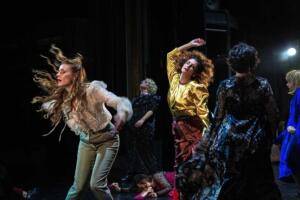
Deca/Children. Press photo.
Borisav: Yes. First I have to say that Irena Popović Dragović’s concept is clever in many ways and successfully combines different aesthetics and symbolics – the everyday language of Milena Marković is delivered through opera singing, the children’s choir sings about death while the adults sing about survival and resilience. And the musical work, composition and actors’ singing are presented skilfully. But let’s not disregard the essence of the story which is about a middle-class woman who feels guilty because of her free-spirited youth (casual sex, use of light drugs, being an outsider at school, etc.) and finds redemption for her shame in becoming a mother. One could argue that this is a fairly traditionalist and anti-feminist message.
Why Are You Sleeping on the Floor, a show directed by Kokan Mladenović that’s based on Darko Cvijetić’s novel, is stylistically and conceptually a completely different performance from Children and, in my view, a much more successful one. It is an ensemble performance about the horrors of the Yugoslav wars in Bosnia and Herzegovina based on the real-life experiences of Darko Cvijetić and his family and acquaintances. But the director’s and dramaturgs’ intelligent addition to Cvijetić’s narrative is the reflection on the author’s responsibility when writing about such sensitive topics – Cvetić performs himself in the show, he is the narrator and at one point the characters openly rebel against him and his version of the story.
But even with differences in the quality of all these performances, I would circle back to our thesis at the beginning that the performances based on contemporary texts are much more vital than classics-based shows in this year’s selection.
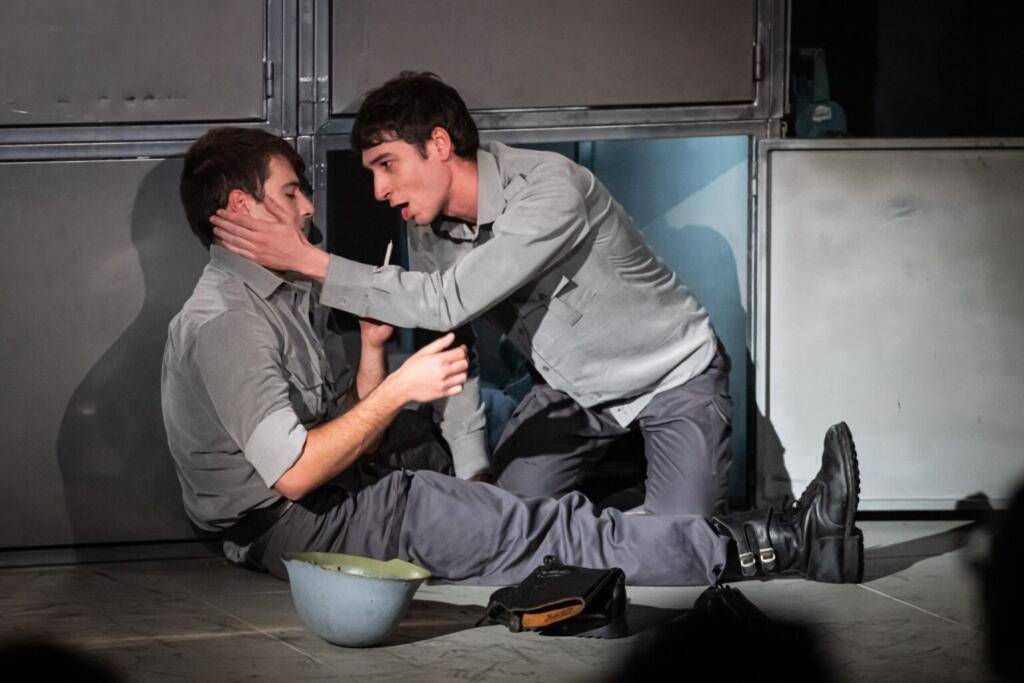
Why Are You Sleeping on the Floor. Press photo.
Andrej: Yes, productions based on classics were conventional and outdated. Take, for example, the play Gospodjica (Miss), a dramatized version of the novel of the Nobel Prize winner Ivo Andrić. The story of the miser and the usurer is staged by Đurđa Tešić in a conventional way for dramatizations: the actors declaratively pronounce lines, the costumes are in the style of the period (the first half of the 20th century in the Kingdom of Serbs, Croats and Slovenes), the set design is an uncharacteristic space where actors can flow in and out unhindered as they spill words in an endless series of scenes. This production is consistently performed in this way, so I’ve got the impression that my grandparents saw similar works in their youth.
Borisav: There is a tendency among many classical-oriented Serbian directors to rely on the quality of old texts and their supposed “universality” so much that they do not bring any innovative or thought-provoking interpretation of the text. This results in the show feeling outdated instead of “universal”.
Andrej: That is precisely the case with The Deceased which is based on a play by the most famous Serbian comedian Branislav Nušić. The director is Egon Savin, a legendary director known for bold actualizations and re-contextualization of classics. But despite his previous tendencies to creatively interpret texts, Savin sets The Deceased in the early twentieth century like the original but relocates the events from Serbia to Montenegro.
The actors, who all play characters prone to corruption, play caricatures, while the protagonist, the only one who is honest, educated and noble, is portrayed more realistically. The play is cleverly constructed, but with such a conventional and overused aesthetic, I felt I was watching it for the hundredth time. And while the male characters are skilled manipulators, thieves and con artists, the female characters are just sexualized. The actresses are often required to show their breasts and buttocks, kneel, seduce and do things that men don’t do by default. It’s a shame that the director, who often knows how to modernize various aspects of the old text, is unable to explore and expose his own misogyny.

The Deceased. Press Photo.
Borisav: And then there’s the Night-Scented Stock where the director Branislav Mićunović tried to interpret Aleksandar Popović’s text but in a such clumsy way – I must use this expression – that it’s a laborious task to find any meaning in the performance. Am I being too harsh?
Andrej: Aleksandar Popović is a prolific writer. He has left behind many iconic plays, but his hyper-productivity has sometimes resulted in scribomania, pompous vocabulary, empty rhetoric, and quarrels with logic, sense and sobriety. And all this is evident in his unbalanced piece Night-Scented Stock. Inexplicable, rarely performed, and even more rarely printed and most rarely understood. Precisely because there is nothing to understand. All I can say is that the show was exactly like that. So much empty rhetoric and stage action that I find it hard to support the argument of how bad it was.
These three pieces make me think about what the selector could have invited to the festival but didn’t. I can think of at least four plays that are artistically innovative, politically relevant, and more exciting and valuable than the three just mentioned. For example, the play Our Son, about which Nataša has written beautifully, World Without Women, about which you have written brilliantly, but also some that we didn’t cover on SEEstage, such as Invisible Children directed by Robert Lenard and Illuminating the Case of a Series of Murders by Poisoning in the Ćuprija District in the 70s of the19 century directed by Anđelka Nikolić. Do you have any in mind?
Borisav: I would also add Before We Begin, another Heartefact production – while Our Son explores gay identity Before We Begin explores trans topics. Interestingly, these two shows together with World Without Women and Illuminating the Case of a Series of Murders… are independent productions. There is no show from the independent scene in this year’s selection, as is also the case with the selections of the last previous years. We know that independent shows can compete for Sterijino pozorje, there is no rule prohibiting that. Yet, it is still taboo to select these shows for the main program of the festival. I would argue that three of these performances (I haven’t seen yet Illuminating the Case of a Series of Murders…) are better than half of this year’s selection. Given that we have a vibrant independent scene where young and experimental artists can express themselves, since the doors of institutions are often closed for them, there is no justifiable reason to exclude these shows from the consideration for Sterijino pozorje.
For the last several years, we argued that Sterijino pozorje’s concept of being a festival of national drama is exclusionary to many theatre artists who work with foreign texts (let’s not even discuss performances not based on text, that’s a whole other discussion). But there are other ways the festival could modernize its concept and be more inclusive, and one way is to consider the independent scene on a more equal term with institutions.
This article was originally published by SEEstage on Jul 3, 2023, and has been reposted with permission. To read the original article, click here.
This post was written by the author in their personal capacity.The opinions expressed in this article are the author’s own and do not reflect the view of The Theatre Times, their staff or collaborators.
This post was written by Andrej Čanji and Borisav Matić.
The views expressed here belong to the author and do not necessarily reflect our views and opinions.

